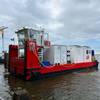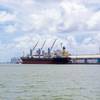BIMCO has launched the BIMCO Solid Cargo Database as an additional feature on the BIMCO website.
According to Niels Bjørn Mortensen, Senior Manager, BIMCO Marine Department, it provides information on various types of dry bulk cargoes. Available only to members, the BIMCO Cargo Database is a valuable supplement to the International Maritime Organization’s (IMO) Code of Safe Practice for Solid Bulk Cargoes (BC Code), the International Maritime Dangerous Goods Code (IMDG Code), the International Code for the Safe Carriage of Grain in Bulk (Grain Code), and other relevant publications.
The BIMCO Cargo Database provides general guidance and information and is intended for use by shore-based staff and vessel crews. In particular, the following items are covered:
Safe practices and appropriate precautions to be taken for hold cleaning, loading, trimming, carriage and discharge, including but not limited to information and precautions on weather, protective clothing, etc for dry bulk cargoes;
Descriptions, characteristics and properties of the most commonly transported dry bulk cargoes;
Guidance and suggestions on the type of certification required for the cargo and the carriage of said cargo as required by the aforementioned IMO codes or by Safety of Life at Sea (SOLAS) requirements;
Guidance as to what occupational hazards may be posed to personnel handling the cargo, for instance as posed by alumina dust which is not only extremely abrasive but can also be toxic if inhaled;
The type of packaging normally used for the shipment of the cargo (bulk and/or bags, barrels, etc.) and the applicable IMO requirements depending upon the type of packaging chosen;
Emergency response section providing guidance on safety procedures in the event of fire or the spillage of the cargo; and
Information on the origin of the cargo.
Additional features
“Also included under each cargo entry is a section on the synonyms or trade names commonly used for the cargo”, Niels Bjørn Mortensen explained. He went on to say, “An easy to use and efficient search facility which enables users to access the information needed quickly is provided as well. Users can find a cargo by typing in its synonym. The official name will then appear. For instance, by typing in ‘petcoke’, an entry for ‘petroleum coke’ will appear. Or should one be asked to carry barium sulphate and wish to know whether it has to comply with any of the codes, for example, ‘barium sulphate’ can simply be typed in to the search function and the cargo entry for ‘barytes’ will appear which, in turn, is subject to the requirements of the BC Code.”
“In addition, users are able to search for a cargo, or similar cargoes in the group by simply typing a generic name (i.e. ‘coke’). A list of different entries will quickly appear (for this example, coke, coke breeze and petroleum coke)”. Niels Bjørn Mortensen said.
BIMCO Reporting Forms
Included in the Cargo Database are easy to use BIMCO Reporting Forms which significantly assist BIMCO’s efforts to improve the situation for vessels in ports around the world. The reporting forms collect data on new or unusual cargo properties and the appropriate cargo handling procedures required
such as cleaning, undue delays, inspection, loading, carriage instructions, unloading and cleaning, etc. as experienced by the ship and her crew.
BIMCO Reporting Forms, which have been used extensively for several years, can easily be adapted into an existing Safety Management System (SMS), as required under the International Safety Management (ISM) regime. The detailed information gathered in the forms is used to produce databases and statistics for use by BIMCO members and in negotiations with various authorities.
Subscribe for
Maritime Reporter E-News
Maritime Reporter E-News is the maritime industry's largest circulation and most authoritative ENews Service, delivered to your Email five times per week










